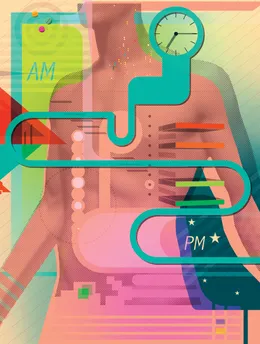Circadian Disruption and Breast Cancer
 In 2017, donations to Cancer Research and the Unrestricted Fund helped to fund Dr. Robert Dallmann and his team's research into how circadian rhythms play a role as both a cancer risk factor, and a mechanism by which tumours develop.
In 2017, donations to Cancer Research and the Unrestricted Fund helped to fund Dr. Robert Dallmann and his team's research into how circadian rhythms play a role as both a cancer risk factor, and a mechanism by which tumours develop.
In virtually all organisms including human beings, biological clocks synchronise most internal physiological processes with the external world’s night & day cycle. Disruption of these clocks, Circadian Disruption (CD), caused by shift-work or other facets of our increasingly 24/7 life-style, has been recognized as a growing threat to human health in general, and “probable carcinogen” (WHO) in particular.
Here, we will further investigate the role of these cellular circadian clocks in cancer using two parallel approaches. We will build on preliminary results from my lab suggesting that some tumours do have a functional clock while others do not. In fact, we have developed a new metric to estimate “rhythmicity” from tumour samples and find this predictive for survival in a cohort of over 200 breast cancer patients.
-Dr. Robert Dallmann, Assistant Professor at WMS
Dr. Dallmann's team already has 2 PhD students working hard to discover more about the links between Circadian Disruption and cancer, and thanks to donations a URSS student (a 2nd year from Life Sciences) joined the project in the summer of 2018, further extending the scope of the project.
If the research determines that tumours with an impaired clock are associated with shorter survival times in breast cancer patients, it could lead to actionable interventions that improve the survival rate of patients suffering from breast cancer.
